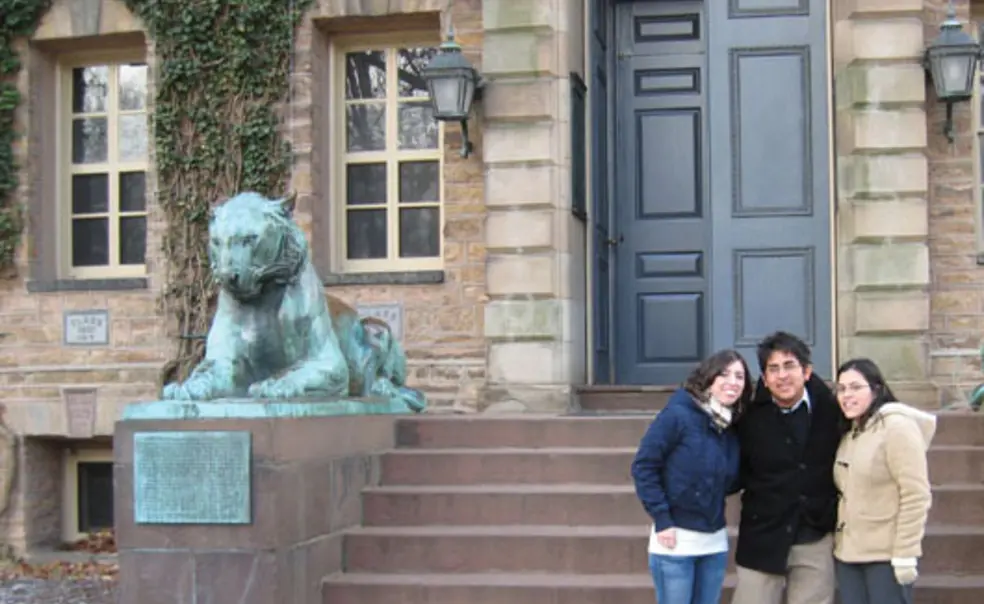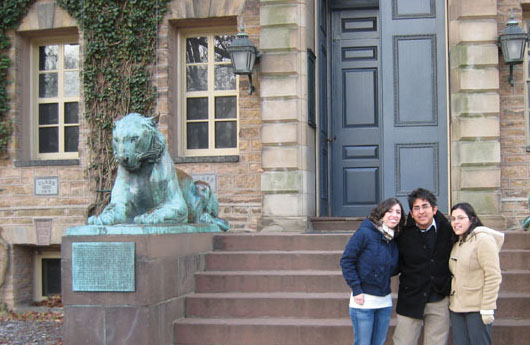Latino students: Changes needed
A coalition of Latino student groups, citing an environment of “isolation and distinct marginalization,” is calling for a strong University commitment to improve the academic and social experiences of Latino students, faculty, and staff.
“Princeton continually fails to provide support and resources to its Latino/a students, especially as compared to other Ivy League institutions,” the Latino Coalition of Princeton said in a report released in September.
The report urged the University to recruit more Latino faculty and administrators, bring Latino scholars to Princeton through a Diversity Scholars Exchange Program, create a Program in Latino Studies, and designate space and an administrator at the new Carl A. Fields Center to provide support for Latino students. According to the University, 378 Hispanic undergraduates are enrolled, about 7.8 percent of the total. The Graduate School has 69 Hispanic students, about 3 percent of the total.
The report described Princeton as lagging behind its peers in the field of Latino studies. While the expansion of the Program in Latin American Studies was praised, the report called for creation of another program — one “dedicated to the study of our experiences as a people here in the United States.” The report said that “a lack of Latino studies is a missed opportunity for Princeton students and faculty to be engaged in subject matter that is truly part of the American experience.”
Victoria Laws ’08, founder and chairwoman of the Latino Coalition and author of the report, said students prepared a report with similar conclusions in 1985. She said the University needs to make a major hire in the field of Latino studies to help attract other scholars, “or a program will not be feasible.” The coalition’s goal is “not just to make our experience better,” Laws said, but to “make Princeton a better institution.”
The report described the percentage of Hispanics on Princeton’s faculty as “embarrassingly low.” According to Dean of the Faculty David Dobkin, 2.5 percent of fulltime faculty members — 21 out of 849 — are Hispanic.
An Undergraduate Student Government survey, released in 2004, found that both Latino and black students gave low ratings to racial diversity, race relations, and social life as compared to their white and Asian peers.
Members of the coalition held a pair of public forums on the report and met with President Tilghman and other members of the administration. One recommendation — to expand a mentoring program for freshmen, developed by the Black Student Union — won quick approval. Janet Dickerson, vice president for campus life, said after meeting with Latino students that she had approved funds to expand the mentoring program to all minority students, beginning this fall.
Administrators need a better understanding of the issues raised, Dickerson said, noting the diversity within the groups represented by the coalition. But she added: “I’m confident that we can provide support for several of their ideas.”













1 Response
Bob Hernandez ’69
10 Years AgoFocus on Latino studies
Re Princeton’s Latino Coalition report (Notebook, Jan. 23): Bravo to the students for pursuing a critical issue for the University’s future. I gasp at the figure of 2.5 percent Latino representation among the faculty.
It is somewhat startling that the best university in the United States has paid relatively scant attention to Latino scholarship, given the demographic surge that portends that a quarter of the population will be Latino/a within a generation. An excellent Latino program is necessary:
• to attract the brightest Latino/a scholars;
• to remain at the forefront of academic excellence in the examination of ethnicity;
• to promote intellectual contributions to specific disciplines;
• to contribute to the resolution of the major social issues of the 21st century.
Latino/a intellectuals in academe offer new, distinctive perspectives in all major disciplines, including linguistics, literature, anthropology, politics, sociology, philosophy, and psychology. Can the University not draw together the brightest among them to study, inter alia, the impact of language and culture on thought and analysis, the sources and use of identity, and the role of image in an electronic age?
The Latino Coalition report describes well the inadequate representation of Latinos in all aspects of the University’s program. Its analysis is sound and makes it incumbent upon all members of the Princeton community to understand and discuss whether Latino studies at Princeton are necessary, and, if so, what they might look like and how we might evaluate them. Kudos, and as we say in French, bon courage.